The designation comes after 11 Fordham students and alumni were selected for the Fulbright U.S. Student Program for the 2023-2024 school year. Currently serving in destinations that range from Côte D’Ivoire to South Korea, they have joined the ranks of hundreds of Fordham students chosen for the program since it began nearly 80 years ago.
“Fulbright scholarships change lives, funding international student research opportunities and creating pathways to careers in academia, industry, and government,” said Tania Tetlow, president of Fordham. “Being a top producer of Fulbrights speaks to Fordham’s investment in scholarship and in our students; we are so gratified by their success.”
This is the sixth time Fordham has been recognized as a Fulbright Top Producing Institution for U.S. students in the past 15 years. The prestigious awards allow students to pursue a variety of international opportunities, including studying, teaching, and conducting research abroad.
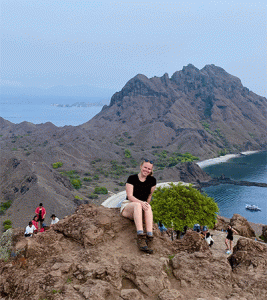
Molly Gleason, a 2021 graduate of Fordham College at Rose Hill, is an English teaching assistant in Indonesia through the Fulbright U.S. Student Program. She applied for the Fulbright after a rewarding summer study abroad program in the country two years earlier.
“I was certain I wanted to return to continue the cultural exchange, and what better way to do that than within a classroom? I teach 10th and 11th graders at a vocational high school in Pekanbaru, a city in Sumatra that rarely has foreigners (I am the only one in the whole city!),” she said. “One highlight of my grant has been the development of an ecology club for my students who have never been exposed to the environmental field. Pekanbaru’s natural areas became immersive classrooms, and together we explored and learned about the ecosystem.”
Fordham students apply for awards like the Fulbright through the Office of Prestigious Fellowships, which offers guidance and support throughout the application process.
“We are overjoyed to be recognized as a top producer,” said Lorna Ronald, Ph.D., director of the fellowships office, adding that the office is eager to “break down the myth that only one type of student can apply for a prestigious award such as a Fulbright.”
“The Fulbright program is an ideal fellowship for any student interested in cultural exchange—and we have many such students at Fordham,” said Ronald. “We work closely with each student as they think through their goals and plans and how a year overseas might benefit them and the community they seek to serve. We can’t wait to work with students again this year, and we encourage all who are curious about this opportunity to come and meet with us.”
Operating since 1946, the Fulbright Program is the U.S. government’s flagship international academic exchange program. Fulbright alumni include 89 Pulitzer Prize winners, 80 MacArthur Fellows, 41 heads of state or government, and 62 Nobel Laureates.
]]>“I was very nervous when I was coming here—halfway through the flight, I was like, ‘Oh, my God, I’m really going,’” said Bhosale, an international student from India who is now a sophomore in the Gabelli School of Business.
But since he’s arrived on campus, Bhosale has found his community; he’s been thriving as a student leader and business student.
A Global Entrepreneur
Studying at Fordham has allowed Bhosale to combine two interests—entrepreneurship as part of his business administration major and global business as a minor.
Bhosale is a student at the Rose Hill campus, but he’s excited to take classes for his minor at Lincoln Center, where the Gabelli School focuses on global business.
“We always have that comforting place other than home, so Rose Hill will be my home,” he said. “But I have a lot of friends at Lincoln Center … and [it’s] a prime location,” he said, noting that the Manhattan campus inspires the creative side of him.
Bhosale said that it was the curriculum that drew him to the Gabelli School, particularly its Ground Floor course for first-year students. The course gives students a background in the major areas of business before asking them to propose a brand-new business idea that meets a current need.
Acting as a consultant, he made a presentation on a company and helped develop an idea for a startup with classmates. “It kind of gave me first-hand experience as to what my future would look like,” he said, and it made him sure he wanted to pursue entrepreneurship.
Community Leader on Campus
Outside of the classroom, Bhosale serves as a leader with the Hindu Students Council, the cultural board of Campus Activities Board, and the International Students’ Association. He’s also a Ramfluencer, making videos and content for Fordham’s social media channels. A favorite is one he made on the Ram Van.
“I cannot stop bragging about it to my friends—I literally go by a shuttle to Manhattan,” he said with a laugh. “So I’ve always loved the Ram Van, and I also made a video on that because I wanted to cover all the points that I did not get to know while I was at home in India.”
He also did a video on Global Transition, a preorientation program specifically for international students.
“I believe that it made me feel at home because when I came here, I was very scattered—I didn’t know what to do,” he said. “But Global Transition, they took us out on an excursion. I went to The Edge. I was in awe when I went to the observatory, and I saw the whole of New York. I was like, ‘Okay, I’m living my dream.’”
Bhosale said that he also made some of his first friends in the program because they all were dealing with similar challenges of being far from home.
Recognized for Success
His efforts to enhance campus community, culture, and academic excellence were recognized last year when he received the DEI Innovative Leadership Award from the Gabelli School of Business.
He said that made him even more excited for his next few years; he plans to get involved at the Fordham Foundry, study abroad with Fordham London, and intern in the city.
]]>For Priya Ravindran, who met her Ukrainian husband at Fordham and later adopted his country as her own, reporting on the war and sharing her young family’s story is an act of resistance.
When Russian president Vladimir Putin ordered a full-scale invasion of Ukraine in February, Priya Ravindran was living in Kyiv with her Ukrainian husband and their 2-year-old son, Neil. The couple met in 2010 as graduate students at Fordham and were married in Kyiv four years later.
“We led fairly normal lives. We worked, traveled within Ukraine and internationally, went out on the weekends, went out to eat, met with friends,” said Ravindran, who was an editor at the Ukrainian state-run news station UATV English before going on maternity leave in 2019. “It wasn’t until February 24 that our lives changed forever.”
Two days later, amid reports of military and civilian casualties near Kyiv, they fled, joining more than 12 million people who would leave their homes following the Russian invasion.
‘Trying to Play My Part’
As they drove away, “Alex asked me in the car, ‘Do you realize you are now officially a mother fleeing war with an almost-3-year-old?’” Ravindran wrote on February 26.

“We always knew this was a possibility. Even before I got pregnant, I asked Alex many times, ‘What if we have a child and full-out war breaks out?’ … Like with everything in life, you try to put those thoughts at the back of your mind, but here we are.”
They headed west with a friend and his mom, driving through numerous Ukrainian military checkpoints. “We are surrounded by the Carpathian Mountains, vast snow-covered fields, and heaps and heaps of trees with just the perfect amount of snow,” she wrote. “Seeing the pristine beauty of nature, I almost think to myself, ‘This is all a dream, right? It has to be.’ But no, this isn’t a dream. … Ukraine is still fighting for its existence.”
On February 28, they arrived at their destination: a friend’s home in Ivano-Frankivsk.
“I have a lot of guilt that I’m not doing enough, not helping enough,” Ravindran wrote that day. “But I’m trying to play my part in letting people know what’s happening, as best as I can, in the best way I know how: through my love of writing.”
Since late February, Ravindran has been posting daily accounts of the war. In each post on her public Facebook page, she typically mixes news and analysis with a firsthand account by another writer as well as personal stories of her family’s experiences and emotions. (To protect her husband’s identity, she uses the pseudonym Alex to refer to him.)
Her posts have reached a broad audience. On March 3, one day before Neil’s third birthday, she was interviewed by Indian TV journalist Barkha Dutt, “whose reporting in the 1990s on the India-Pakistan war convinced me as a 12-year-old to be a journalist,” Ravindran wrote.
From Mumbai to Kyiv via Rose Hill
Born in Mumbai, Ravindran was 17 years old when she moved from India to the U.S. to attend college. After earning a bachelor’s degree in journalism and international relations at the State University of New York at Oswego, she enrolled at Fordham to pursue a master’s degree in political science.
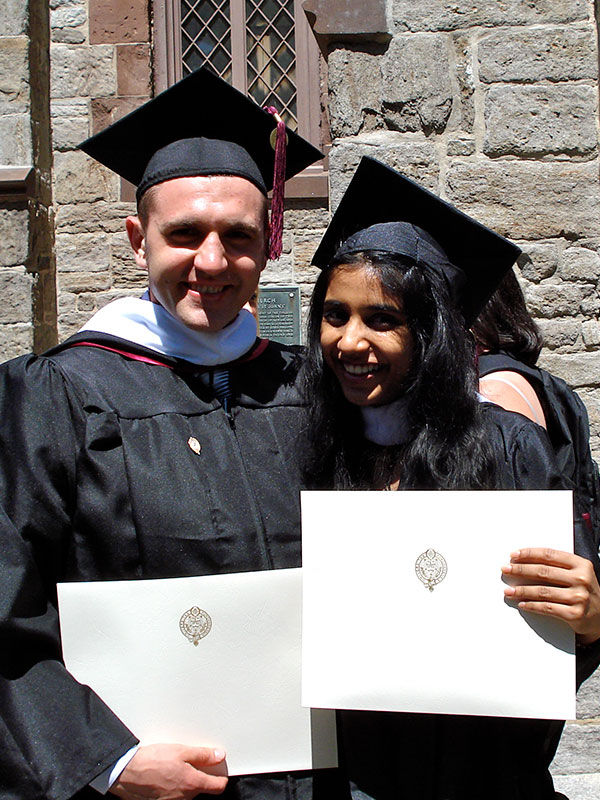
The day before her classes started in fall 2010, she left her walk-up apartment on Arthur Avenue to buy groceries. “When I returned, I was holding the door to the building open with one leg while pushing all my bags in,” she said. “At the same time, Alex exited his apartment on the first floor, stopped, and asked me if I needed help. I told him I could manage, but he insisted, so he carried all my bags upstairs and started to run away. I screamed ‘Priya!’ after him, and he said, ‘Alex!’”
Alex had arrived at Fordham on a Fulbright Fellowship, and he was enrolled in Fordham’s International Political Economy and Development program. The two saw each other in class the next day, Ravindran said, but it wasn’t until the end of the semester that she learned that they share a love of trance music. “I invited him and his roommates to a concert by a famous German duo,” she said. “He asked me out the next day, and the rest is history, as they say.” They were married in Kyiv on June 26, 2014.
A Rousing Song for the Motherland
In her daily posts on Facebook, Ravindran has covered numerous aspects of the war. In early July, she published transcripts of phone conversations intercepted by the Ukrainian Security Service in which Russian soldiers discuss the killing of civilians. In mid-May, she shared the results of a Kyiv School of Economics study indicating that, as of May 10, the war had caused an estimated $600 billion in economic losses in the country. And in June, she covered a nightly address by Ukrainian president Volodymyr Zelenskyy in which he said that at least 828 children had been affected by the war—446 injured, 243 killed, and 139 missing.
“We talk about war and its impact in numbers, and as jarring as they may be,” Ravindran wrote, “they don’t always convey the full story. … They don’t tell us about the trauma parents and their children are dealing with. We remember so many wars in numbers, but we forget about the stories.”
Amid the fear and anxiety of the war, and the near-constant threat of air raids, she has found moments to celebrate: the “happiness on Neil’s face” when he gets a couple of “siren-free” hours to play in a local park, for example, and the “immense joy” of seeing the Ukrainian rap and folk band Kalush Orchestra win the annual Eurovision Song Contest in mid-May.
“It doesn’t mean anything for the war,” she wrote at the time, “but it was a small relief for the psyche.” She noted that the band’s lead singer, Oleh Psiuk, wrote the winning song, “Stefania,” as an ode to his own mother. But since the Russian invasion, the song has taken on new meaning.
“People have been using the song to symbolize Ukraine—the yearning of children who have been separated from their mothers because they are serving in the military; the emotions of sons who are missing their mothers who crossed the border to bring their other siblings to safety; the pain of children who have lost their mothers to the war,” Ravindran wrote.
And with lyrics like, “I’ll always find my way home, even if all roads are destroyed,” she added: “Some are reminded of the motherland itself.”
Read Priya Ravindran’s Ukraine war journal on Facebook at @pravindran1.
]]>This fall, Fordham welcomed nearly 200 first-year international students to the Rose Hill and Lincoln Center campuses. The students come from more than 50 countries and study a variety of disciplines, including business, STEM, and communications.
From Aug. 24 to 27, the first-year international students settled into their dorms and explored the city. They began Global Transition with trips to Target and Bed Bath & Beyond, where they stocked up on supplies. They also attended orientation sessions that showed them the ropes around campus. On the final day of the program, they visited some of the most popular places in the city, including the Top of the Rock, Chelsea Market, and Central Park, located just a few blocks away from the Lincoln Center campus.
In total, there are about 700 international undergraduate students at Fordham, said Salvatore Longarino, director of the Office of International Services. The students come from nearly 90 countries, largely from China, India, Vietnam, and Brazil. This year’s total number of international undergraduates is higher than last year’s headcount, 662, said Longarino.
High School Sweethearts in Vietnam
First-year student Vanessa Mautone, GABELLI ’26, said she has lived in six different countries. Mautone was born in Geneva, Switzerland, and lived in Malaysia, Italy, France, Vietnam, and the United Kingdom. Her father’s job as general manager for an international company required their family to relocate several times, she said. Mautone had visited the U.S. only once in 2016—on a trip to New York City—and now the place that she explored as a tourist will become her home.
“I want to go into event organization in the future and heard that the Gabelli School of Business was an amazing school to study business in, especially at the Lincoln Center campus where I’m probably going to have a lot of amazing internship opportunities,” said Mautone.
Mautone’s partner, Huy Nguyen, who met Mautone when they were high school students in Vietnam, is also attending Fordham as a first-year student. Nguyen was not part of Global Transition because he holds dual citizenship in both the U.S. and Vietnam, but he was born and raised in one of the largest cities in Vietnam, Ho Chi Minh City, where he said he has lived his whole life.
Nguyen, a theater major, said he was attracted to Fordham College at Lincoln Center because it stands out from every other campus in the city.
“I’ve always had an interest in performance, especially acting. Being located in the middle of Manhattan, I couldn’t have made a better decision. My ultimate goal is to end up in films, and I believe that the Fordham Theatre Program provides the most hands-on education experience,” he said.
A ‘Homey Feeling’ From India to the U.S.
Preeti Lamba, FCLC ’26, was born and raised in India. She said she attended a high school that shares the same Jesuit values as Fordham.
“I used to be in a Catholic school,” said Lamba, who attended Holy Child Auxilium School in New Delhi. “What I like about Catholic education is the discipline, values, and ethics that helped me to transform my life in the best way possible. … I feel like I can continue the same at Fordham. It gives me a lot of homey feeling.”
Lamba said she chose to attend Fordham because of its diversity, student-to-teacher ratio, and potential for networking in the heart of a global city.
“At Fordham, I seek a vision to build a good network and take part in activities, be a leader, and encourage others to stand for themselves. I want to be part of various clubs like graphic design and culture,” said Lamba, an economics major who hopes to become an entrepreneur or an analyst someday. “I also want to make everyone a part of the Ram family, bring change, and advocate for people.”
]]>The consortium is inviting faculty to become affiliated members.
“What we really want to do is incorporate a lot of the work that our faculty and staff are doing all over the world, and channel them through the consortium,” said O. Hugo Benavides, Ph.D., consortium director and chair of the sociology and anthropology department.
Collaborating to Avoid ‘Double Efforts’
Benavides formed the consortium last fall along with two co-directors: Aseel Sawalha, Ph.D., associate professor of anthropology, and Matthew Chin, Ph.D., assistant professor in the Graduate School of Social Service. GSC’s goal is to promote and integrate existing global research initiatives across the University’s different schools, departments, and programs—especially projects that are very similar.
“That’s one of the things we’re really interested in, so that people don’t do double efforts and reinvent the wheel,” said Benavides. “[With the consortium] they can reach out very easily to other colleagues that are doing similar work.”
To better understand the needs of his colleagues, Benavides and his colleagues hosted a forum this past November at the Lincoln Center campus. About 20 faculty members from at least four different schools sat at a table and shared their research objectives. A similar forum will be held next spring. Over the next couple of months, GSC will also create a consortium listserv and website.
“Our hope is to get people talking to each other so that they could do more collaborative research projects and apply for external grants,” Benavides said.
Research Abroad
The group is also planning for some travel. It will be co-sponsoring the third Fordham University Faculty Research Abroad Program (FRAP), designed to facilitate research collaboration between Fordham and foreign scholars, next summer in Rio de Janeiro, Brazil.
“Members who are affiliated to us have access to form different collaborations with other universities and colleagues at other universities,” Benavides said.
At the heart of the consortium is research that has an impact on local communities, said Benavides.
“We want to get involved with activists and artists and local communities and the kind of issues that are important and relevant to us today,” Benavides explained. “And particularly to use the strengths that our faculty have.”
Anyone interested in becoming a GSC affiliated faculty member should contact Benavides, Sawalha, or Chin at [email protected], [email protected], or [email protected].
]]>A look at that convention as well as three other U.N.-related anniversaries—the first for the Global Compacts on Migration and Refugees, the 20th for the passage of the Security Council Resolution 1325, which addressed the specific impacts of armed conflict on women and girls and the 23rd of the Fourth World Conference on Women: Action for Equality, Development and Peace held in Beijing, were the major themes at a conference titled “Why the U.N. Matters,” held at Fordham Law School on Nov. 25.
The conference was organized by the Fordham Institute for Women and Girls, the Fordham Graduate School of Social Service, and the International Health Awareness Network (IHAN). GSS and IHAN also sponsored a student essay contest, and the top two student papers were presented at the event.
Yung Hsien Ng Tam, MSW ’21, a foundation year student in the program, who has been placed at OHEL Children’s Home and Family Services, presented her paper titled, “The 1995 Beijing Conference on Women: Progress and Challenges for Women”.
Sydney Boyer MSW ’20, an advanced student in the program, who is placed at the Unitarian Universalist United Nations Office, presented her essay on “The Forgotten In Global Policy.”
The conference also featured presentations from Sandra Turner, Ph.D., director of the Women and Girls Institute at GSS, Marciana Popescu, Ph.D., professor in the Fordham Graduate School of Social Service, on the global compact for safe, regular, and orderly migration, Jourdan Williams, the director of global policy and advocacy for the International Health Awareness Network on the U.N.’s security resolution on women, peace, and security; and Dr. Sorosh Roshan, founding president of IHAN, who discussed what it was like to be at the Women’s Action conference in Beijing.
The event examined the initiatives, treaties, and resolutions that came out of those U.N. events and detailed the issues that still exist and the work that still needs to be done.
A look at challenges for migrants, refugees
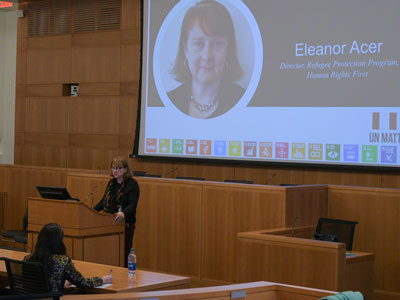
In light of the one-year anniversary of the Global Compacts on Migration and Refugees, Eleanor Acer, LAW ’88, director of the Refugee Protection Program, Human Rights First, shared her experiences seeing “the impact of the failure to uphold human rights protections, particularly with respect to women and girls, as well as others, who are seeking U.S. refugee protection at our borders as we speak today.”
Acer said that she and her colleagues “spent an awful lot of time over the past year visiting women, children, and other asylum seekers at our borders … as well as in immigration detention facilities around the country.”
“At the border, the Trump administration has worked to ban and block refugees from seeking protection at the U.S., turning them back to Mexico through a number of different policies, and now some of you may have heard of some reports of people being sent back to Guatemala or to Honduras and El Salvador,” she said.
Acer, who received the Louis J. Lefkowitz Award for Public Service from Fordham Law in 2007, said that this made those seeking refuge susceptible to attacks
“Many of the areas that the Trump administration is turning people back to are essentially ruled by cartels,” she said. “Refugees and migrants and women and children in particular are very vulnerable to being targeted. There have been reports of kidnappings, attacks, sexual assaults of asylum seekers and migrants all across the border.”
Acer said that her organization has been working since 1978 to “push the U.S. government to be a strong voice for human rights around the world and here at home to live up to our own human rights obligations.”
“Needless to say, these days our challenges are greater than ever,” she said.
Human rights at the local level
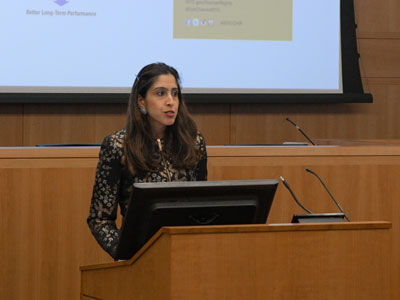
Geeta Tewari, the associate director of the Urban Law Center at Fordham Law School, said that cities, particularly New York City, could lead the way in adopting some of the human rights goals that championed equality.
“New York is one of the most powerful cities in the world … I cannot emphasize enough how much of a moral obligation our city has, given that the city is a leader in finance, fashion, medicine, and art,” she said. “We can serve as a model to other cities, for how we treat people, how we value our citizens and their rights as human beings.”
Tewari said that because gender equality was specifically stated as one of the “17 Sustainable Development Goals” from the U.N. for this year, it was essential that cities like New York lead the way in that area.
Aid for children in war areas
Children who are living in war or disaster areas should also be a focus for the international community, according to Laura Perez, the Helen Hamlyn Senior Fellow at Fordham’s Institute of International Humanitarian Affairs.
About one in four children currently live in a country affected by conflict or disaster, said Perez. More than 50 million children migrated across borders or have been displaced by conflict from 2005 to 2015, Perez said, highlighting a 2016 report from UNICEF. This can have devastating long-term effects.
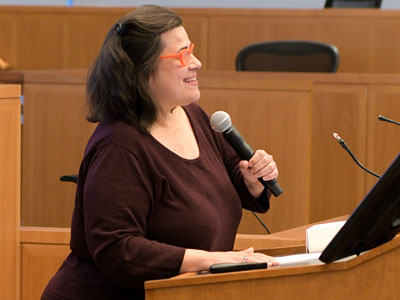
“Refugee children forced from their homes are five times more likely to be out of school than other children,” she said.
Next steps for gender equality
In an effort to continue the work brought about by the featured U.N. conferences, Houry Geudelekian, who chairs the Non-Governmental Organization Committee on the Status of Women (NGO-CSW/NY), spoke of her organization’s efforts in working with the “Generation Equality Movement,” which aims to put together the “most comprehensive blueprint to achieve women’s empowerment and gender equality.”
The goal is to bring together stakeholders from across the world and gather their ideas on six major themes that impact equality for women: environmental protection, freedom from violence and stigma, poverty eradication, inclusive development, peaceful societies, and gender-responsive institutions. Through both online and in-person events in France and Mexico in 2020, the effort aims to “chart an agenda of concrete action to realize gender equality before 2030.”
]]>Four years ago, the University committed to Generation Study Abroad, an initiative spearheaded by the Institute of International Education, to double the number of students studying abroad. At the time, 36% of Fordham undergraduates studied abroad. This month, the institute officially recognized Fordham for passing the 50% threshold.
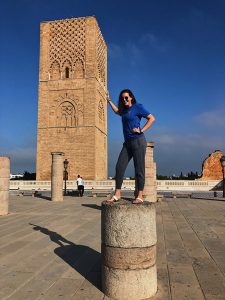
Joseph Rienti, Ph.D., director of Fordham’s International & Study Abroad Programs, said hitting that number was key to fulfilling Fordham’s goal of educating students to be leaders in a global society.
“It’s one of the best ways we find students can broaden their knowledge of themselves, of their academic discipline, and the world around them,” he said.
“It gives them an opportunity to experience a different culture, a different academic context, and it really just brings that global dimension to their undergraduate education.”
The increase didn’t happen by accident. Rienti said the department underwent a reorganization as part of the push to increase participation. Specific areas of study, such as short term-programs, exchanges, and the London Centre now have individual staff members dedicated specifically to managing them. Outreach has been overhauled as well, and the department now recruits students to be “global ambassadors” and gives them Canon Rebel cameras to document their study abroad trips.
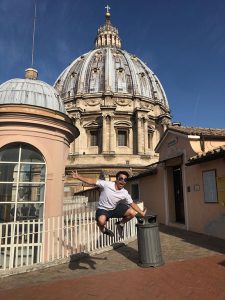
“We think it helped. It’s really given us an opportunity to capture what the students are seeing and doing, and to share with students here in New York, to get them excited about going,” he said.
The new London Centre campus has had a palpable effect, Rienti said, as it enabled his department to offer additional programs, including one connected to internships. The University’s study abroad program in Granada has also expanded in the last three years. Rienti said his department has also worked with faculty to both develop summer courses abroad and add international components to courses that take place in New York.
Exchange programs are also a key area of expansion; most recently Fordham has established two with Institut d’études politiques de Paris and the University of Helsinki in Finland. And just as importantly, Rienti said all of the
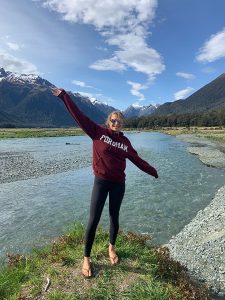
26 exchange programs have been designed so that students can tap into the financial aid packages they use in New York City, making cost less of a barrier.
“What we’ve done is very strategically look to expand those opportunities, aware of the fact that we could make studying abroad sometimes even less expensive than studying in New York,” he said.
The department has also distributed an additional $50,000 in aid to students last year, thanks to a fund maintained by donations from parents, alumni, and even current students who want to help their peers.
“Sometimes students still have airfare to pay for, there’s still visas to pay for, and we’re able to give some additional funding to students,” he said.
Participating in Generation Study Abroad was helpful, he said, as it added another level of accountability to the department’s goals.
“We had to report back to the institute, and we were able to participate in conversations with other colleges and universities how to come up with innovative ideas and different strategies to get participation up,” he said.
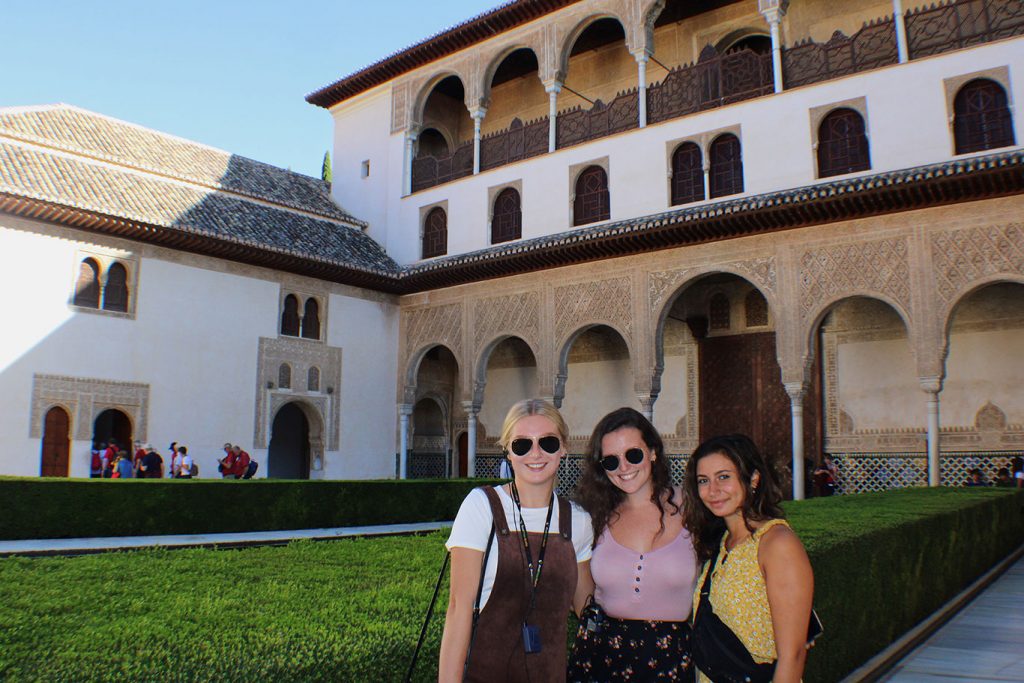
“Universities are challenged in an urgent way by the questions that are now posed, questions that are after all existential, that are of the survival of the biosphere, of deepening inequality, of a return to the language of hate, war, and fear, and the very use of such science and technology yet again for warfare rather than in serving humanity,” he said.
The Sept. 30 lecture was part of the Ireland at Fordham Humanitarian Lecture Series, a partnership between the Permanent Mission of Ireland to the United Nations and Fordham’s Institute of International Humanitarian Affairs. (Watch the full lecture here.)
Higgins, a poet and former professor, said the Irish lost at least one million lives to starvation during the Great Potato Famine and saw more than 2.5 million emigrate. Therefore, the nation holds a collective memory that resonates with today’s crisis.
“We have known what it is to be hungry,” he said in his lecture, “Humanitarianism and the Public Intellectual in Times of Crisis.”
He noted that the Irish famine was editorialized in some newspapers as “an act of God.” The difference today, he said, is that the constant drumbeat of the news cycle desensitizes the listener.
“[Today,] we’ve become accustomed to narratives of how men and women throughout the world as refugees find themselves, through extended periods of time in unsuitable accommodation, confined to forced idleness, without even control over their daily diet,” he said.
Eugene Quinn, director of the Jesuit Refugee Service in Ireland, he noted, has said that children grow up “without the memory of their parents cooking a family meal.”
He lamented that millions of refugees spend years stranded in semipermanent camps around the world, while world leaders discuss the “internationalism and interdependency” of international trade.
“In fact [the conversation]nearly always begins with trade. This has devalued everything, really, in relation to intellectual life, and it has devalued diplomacy very seriously.”
He said that people’s loss of citizenship is so much more than a loss of a homeland. The rights of displaced humans become distinct from the rights of “the citizen.” Without citizenship, refugees lose their inalienable rights as a person, as well as their voice, he said, referencing Arendt.
“To be stripped of citizenship is to be stripped of words, to fall to a state of utter vulnerability with avenues of participation closed off, and thus new futures disallowed,” he said.
Given their past, he said that it falls to the Irish, at home and abroad, to be exemplary to those seeking shelter, especially since it is a crisis that will continue, fostered by climate change and exacerbated by precarious political situations.
“This is a deepening, if you like, of what I call the intersecting crisis of ecology, economy, and society,” he said.
But unlike the welcome that many European refugees received in the wake of World War II, today’s refugees have been shunned.
“The relatively small number of refugees reaching our borders [in the West] has brought forth the type of narrative about ‘the other’ that we in the humanitarian tradition had hoped was assigned to the chronicles of the past,” he said.
“Countries whose citizens have often benefited from international asylum and migratory flows are reneging on their commitments with the aim of discouraging or inhibiting refugees from seeking the international protection to which they are entitled.”
It is here, he said, that public intellectuals and universities must play a crucial role to alter a discourse “soured by hateful rhetoric.” However, he added that today’s charged atmosphere has not made it easier for the academy to exert influence, with some in the community seduced by corporate power, and others complacent with current economic models as the only way forward, he said.
He asked what is being taught in Economics 101 in North America, and questioned how much of it was game theory and how much was real political economy, to say nothing of the coursework’s moral content. He worried that an emphasis on funding beyond the state has had a disjointed effect on the career structure of young scholars.
“I believe public intellectuals have an ethical obligation as an educated elite to take a stand against the increasingly aggressive orthodoxies and discourse of the marketplace that have permeated all aspects of life, including within academia,” he said.
Edward Said said it best when he stated that an intellectual’s mission in life is to advance human freedom and knowledge, he said.
“This mission often means standing outside of society and its institutions and actively disturbing the status quo. Yet it also involves placing a strong emphasis on intellectual rigor and ideas, while ensuring that governing authorities and international intermediary organizations are well-resourced. To quote Immanuel Kant, ‘Thoughts without content are empty, intuitions without concepts are blind.’”
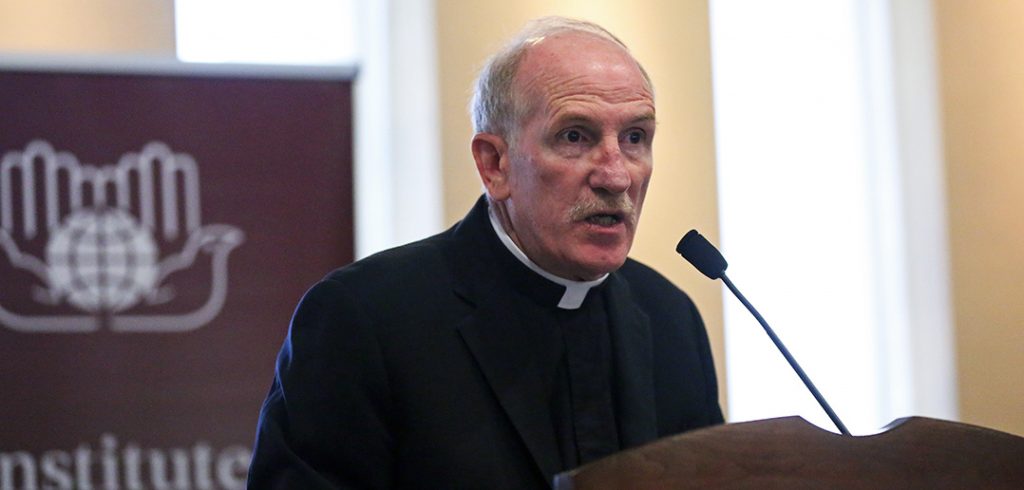
The injustices of offshore tax evasion. The relationship between Sigmund Freud and his mentor Jean-Martin Charcot. The connection between stress responses and glucose-sensing neurons in the brain. The power of dance to promote social-emotional learning.
These topics sparked the interest of three recent Fordham College at Lincoln Center graduates whose research papers were honored by the Global Undergraduate Awards, a Dublin-based program that recognizes top undergraduate work and seeks to connect students across cultures and disciplines.
Examining the Injustice of Tax Crimes
Public awareness of offshore financial crimes has risen since the publication of the Panama and Paradise Papers in 2015 and 2017, respectively, but Briana Boland, FCLC ’19 was left wondering whether the attention has resulted in increased regulation.
For her foreign service seminar, the international studies major looked at the tax governance policies of the United Nations, the Organization for Economic Cooperation and Development, and the Group of 20, the international body composed of leaders from nearly two dozen of the world’s largest economies.
What she found is that while public scrutiny of offshore finance has increased, there has been little progress toward better international tax governance.
“Global governance mechanisms have failed to effectively regulate tax avoidance,” Boland writes in “Tax Injustice: The Failure of Public Scrutiny to Translate into Global Tax Governance.”
She does express optimism about the potential for increased public attention to lead to better regulation, stating in the paper’s conclusion that “[p]ublic engagement and activism to hold states and intergovernmental organizations accountable … is critically important to ensuring any future justice and equality in the international economy.”
Boland’s paper was recognized by the Global Undergraduate Awards as a Highly Commended entry in the political science and international relations category—a designation given to the top 10% of papers submitted in each subject area. It later was named a Regional Winner, meaning it was deemed the best paper in that category in the United States and Canada.
Boland described the recognition as “a tangible result of hard work and scholarship,” and expressed gratitude to her faculty mentor, adjunct instructor Anna Levy, “for encouraging me to pursue my research interest in the topic and for continuing to work with me even after our class had ended.”
Since graduating from Fordham last May, Boland spent the summer in Dalian, China, studying Chinese as a recipient of the Critical Language Scholarship from the U.S. State Department. Now she’s back in New York City interning for U.S. Sen. Kirsten Gillibrand on immigration and foreign affairs issues.
Freud as a Mentee—and the Amygdala’s Role in Eating Behavior
Kaetlyn Conner, FCLC ’19, who majored in integrative neuroscience, produced two award-winning papers.
In “Charcot: The Catalyst of Freudian Psychoanalysis,”—which received the Global Undergraduate Awards’ Highly Commended designation in history—she focused on the relationship between Sigmund Freud and one of his mentors, Jean-Martin Charcot. Conner decided to write about Freud and Charcot as a final assignment for her interdisciplinary capstone course, Hysteria/Sexuality/Unconscious, taught by professors Doron Ben-Atar and Anne Hoffman, because they were both prominent figures in the study of hysteria and sexuality.
Freud worked under Charcot, a prominent neurologist, at Paris’s La Salpêtrière hospital in 1885 and 1886, an experience that gave Freud the tools to invent the practice of psychoanalysis, Conner wrote.
“Freud’s ideas about trauma, sexuality, and hypnosis, that were formed and shaped by his early exposure to male hysteric patients and Charcot’s therapeutic methodologies, went on to have significant impacts on Freud’s way of thinking,” she wrote.
“By studying the works of both men, I was able to draw parallels between the two and infer some of the effects that Charcot’s work may have had on Freud’s career.”
Conner’s second paper earned the Highly Commended honor in psychology.
In “Glucose-Sensing Neurons in the Medial Amygdala and their Role in Glucose Homeostasis,” she investigated the way the medial amygdala portion of the brain responds to glucose levels, and how that affects subjects’ eating behaviors.
While most studies on glucose-sensing in the brain have focused on similar neurons in the hypothalamus and brain stem, Conner finds that the medial amygdala, which is central to reproductive, sexual, emotional, and defensive responses, may also have a role in feeding behaviors or glucose regulation.
“As obesity rates in America continue to rise at alarming rates,” Conner writes, “research investigating the neuronal processes and mechanisms behind feeding behavior will continue to be of the utmost importance.”
The paper came out of an independent research project Conner conducted under the supervision of Sarah Stanley, Ph.D., at the Icahn School of Medicine at Mount Sinai Hospital. Conner continued to working in the Stanley Laboratory after graduating from Fordham, thanks to a grant from the American Heart Association that allowed her to extend her work there through the summer. More recently, she moved back to her hometown of Pittsburgh for a job as a research specialist in the CARE Laboratory at the University of Pittsburgh Medical Center, which studies how parental care is related to how children learn to express and regulate their emotions using brain and behavioral methods.
Conner says that her research and professional success reaffirm that she chose the right school.
“Fordham’s unique mixture of supportive peers and engaging professors really challenged me and gave me the space to explore new areas of research that I had not previously considered,” she said.
Dance Education as an Agent for Change
Caroline Shriver, FCLC ’19, double majored in dance and Latin American and Latino studies, and she brought both of those subjects to bear in her award-winning research, which was recognized in the anthropology and cultural studies category.
In “Becoming an Agent for Positive Change: Youth Development of Self Efficacy and Agency through Social and Emotional Dance Education in Aguas Frías, Colombia,” Shriver sought to demonstrate how Colombia’s tumultuous history and identity of conflict pervade the country to this day, and how students would benefit from an emphasis on social-emotional learning.
After teaching dance-based social-emotional learning classes in the rural community of Aguas Frías and conducting interviews with a number of her students, she found that “a physicalized form of social-emotional learning gave students the opportunity to develop a degree of self-efficacy.”
In these classes, she had students take part in physical trust-building exercises, and she asked them to teach a dance move to their peers to build a collaborative choreography.
Employing her research and that of others, she concluded that physicalized social-emotional education “offers an effective strategy to combat Colombia’s social order of conflict and provides a vehicle for young people to develop personal and cultural agency.”
Since graduating from Fordham, Shriver traveled to Spain, Berlin, and Panama, where she participated in dance workshops and taught dance. She also led a group of 13 undergraduate dancers from the U.S. on a dance outreach trip to Colombia. After returning from these travels, she has been freelancing as both a dancer and dance teacher. She said she plans on continuing to pursue a career as an artist and social activist.
“This award reminds me that arts education can have a positive impact on young people around the world, and it inspires me to further develop and share my passion for dance education,” Shriver said.
Boland, Conner, and Shriver are not the first Fordham students to be recognized by the Global Undergraduate Awards. In 2018, Joshua Anthony, FCLC ’19, was named a Global Winner for his paper on the morphing historical perceptions of La Malinche, the indigenous woman who was the chief translator to Hernán Cortés.
“The range of the majors and minors of these winners captures just some of the breadth of the many academic and research opportunities offered at Fordham University,” said Josie Grégoire, J.D., assistant dean for seniors at Fordham College at Lincoln Center. “We are delighted with their success.”
]]>
Cơm Tấm Ninh Kiều
This unassuming spot under the 4 train on Kingsbridge Road greets visitors with a warm atmosphere that smells of basil, coffee, and rice. Cơm tấm is Vietnamese for broken rice, referring to a dish made from fractured rice grains, explains Ruby Nguyen, the co-owner of the restaurant, and Ninh Kiều refers to the urban waterfront district Cần Thơ. Many of the restaurant’s dishes are classics from Saigon, the hometown of chef Chang Lam, Nguyen, and many of their Vietnamese neighbors in the Bronx. Nguyen’s favorite dishes are Bún bò Huế, inspired by the city of Huế, with spicy beef, pork broth, beef brisket, Huế-style sausage, pork knuckle, and blood cake, and Cơm tấm Ninh Kiều, a rice plate with grilled pork chop, meatloaf, eggs, crispy shrimp dumplings, and shredded pork. Don’t forget to try the Vietnamese iced coffee, made with sweetened condensed milk and strong enough to power you through a 12-hour day.
Price: $, family-friendly
[doptg id=”153″]La Morada
La morada is Spanish for both purple and dwelling place or home. The menu offers traditional Oaxacan dishes, including six different types of mole. Two favorites are mole Oaxaqueño, which is made with seven types of chiles, and mole blanco, made with pine nuts, almonds, and cashews. Chef-owner Natalia Mendez and her daughter Carolina created the menu. Mendez owns the place with her husband, Antonio Savaadra; all three of their children are involved in the business. Marco, an artist and poet, is the host; his watercolors can often be found on the purple walls. “It’s about sharing who we are,” he said. Protest banners and art also adorn the space, and there’s a sizable lending library in the back. Try their food and the need to return that book won’t be the only thing calling you back!
Price: $-$$, family-friendly
[doptg id=”154″]La Masa
La Masa is a bustling family restaurant in the heart of Morris Park. The founders, Joswar Montalvo and his wife, Laura, started the business five years ago, showcasing food from Montalvo’s homeland of Colombia. Empanadas are what La Masa is famous for, and there is one for everyone’s taste; they’re filled with everything from cilantro lime chicken, shrimp, and roasted eggplant to Nutella and apple pie—made special for Montalvo’s daughter who wouldn’t eat any of the others. Try the passion fruit flan!
Price: $-$$, family-friendly
[doptg id=”156″]Al-Aqsa + Premium Sweets
Al Aqsa is a Bengali restaurant on Starling Avenue in Parkchester that makes everything from biryani to bhorta. Biryani is a dish made of fragrant rice, meat, and ghee, and often prepared for holidays. Bhorta is a mash of vegetables, fish, or legumes and is a staple dish in many Bengali homes. Mohammed Hasnat, the owner of Al-Aqsa, said his favorite dishes are the fish curries. This writer’s favorite is the shutki bhorta which is made of dried fish and red chili peppers. Hasnat started the restaurant in 2007 because there was a growing population of Bengalis in the community; his dishes are ones that you would find in a traditional Bengali home. After you’re done with lunch or dinner at Al-Aqsa be sure to stop by Premium Sweets, just across the street, for a cup of cha and Bengali desserts.
Price: $, family-friendly
[doptg id=”157″]Mama G’s African Kitchen
Marked by a graffiti mural on White Plains Road, this spot has a bar-like ambiance complete with a large TV playing soccer in the back. But unlike other sports bars, you won’t find burgers and fries coming out of the kitchen. Africans from Nigeria to Senegal gather in this welcoming spot, where house favorites include okra stew and banku, a kind of bread made with fermented corn mixed with cassava. The owner, Mama G, said the menu is full of recipes passed down from her mother and grandmother. Mama G, short for Gina Nti, is from Accra, Ghana, but the Bronx has been her home for over 20 years. The borough is her heart, she said, and she encourages those who have never had African food to stop in and try some.
Price: $-$$
[doptg id=”155″]Havana Cafe
Havana Cafe was opened in 2010 by three friends, Troy Perez, Kevin Alicea, and Ruben Rodriguez, all of whom grew up in the East Tremont area where the restaurant is located. The New York State Assembly citation framed on the wall inside reads, “Havana Cafe brought the Cuban experience to the Bronx, celebrating Cuban culture, cuisine, and customs.” The trio has extensive experience working in the restaurant industry in Manhattan, and they wanted to bring that Manhattan vibe to their home in the Bronx. Their menu includes many Cuban classics, but also features dishes from Puerto Rico and other Latin cuisines. Try the pastelon, a lasagna layered with meat, cheese, and sweet plantain.
Price: $$, family-friendly
[doptg id=”158″]Ali’s Roti Shop
Ali’s Roti is a small hole-in-the-wall place that packs a serious flavor punch. The family-owned Trinidadian restaurant has been around since the ’70s. It’s located next to a Montefiore Hospital, so you’ll see many nurses in line for lunch. They are famous for their enormous roti, round flatbreads made with flour and served with either meat or vegetables. The menu offers a lot of vegetarian options, including lentil, chickpeas, and cabbage dishes. The roti can easily be split between two people and come with a tangy tamarind sauce. Try their juices; their peanut punch is a perfect post-roti desert.
Price: $, cash only
[doptg id=”159″]Kingston Jamaican Bakery
Kingston Jamaican Bakery was started by John and Joyce Levi in 1970 in the Wakefield section of the Bronx. There is always a long line here, especially on weekends, but it’s well worth the wait. There are three options for patties: beef, chicken, and vegetarian. These are not your typical patties, says Caroline Sinclair, the sister of the owner, with a smile. Many locals say that you haven’t had a patty until you’ve had one made with coco bread from Kingston Jamaican Bakery. The patties are freshly baked using seasonal ingredients, and the dough is made from scratch. Their carrot cake rivals Lloyd’s Carrot Cake in the Bronx. It’s dense with butter and laces your tongue with nutmeg.
Price: $, cash only
[doptg id=”160″]Narciso Bakery
Take note: not all the Bronx Italian bakeries are on Arthur Avenue! This one, on White Plains Road, is a family-owned business run by Sicilian native Vincent Passafiume, his wife Giovanna, and his daughter Rose. The signage out front is simple and the window displays a line of freshly baked bread. The place has an old-world vibe complete with a vintage bread slicing machine. The raisin swirl bread is filled with walnuts. Mini-cheesecakes are filled with custard and berry jams. Passafiume has been baking here for over 30 years. He immigrated to the United States in 1974 when he was 17 years old and has worked only in Bronx bakeries ever since. What’s special about this bakery is the diversity of people who come through the doors. The customers hail from the Caribbean, Korea, and everywhere in between, and Passafiume and his family all make them all feel at home.
Price: $, cash only
[doptg id=”161″]Seven Spices
An ode to Guyana, Seven Spices is adorned with an awning brightly decorated with palm trees and the Guyanese flag. George DaSilva, a gold miner from the nation’s Berbice region with a passion for food, opened the restaurant in 2011. It is one of only three Guyanese restaurants in the Bronx. The vegetable sides are almost like desserts. The pumpkin and spinach have a creamy consistency and a light sweetness from coconut milk. The okra is lightly spiced, a perfect companion to rice and peas. The mac and cheese and oxtail here are customer favorites. Both are cooked to perfection: a crispy crust of cheese sits on top of the mac and the butter beans in the oxtail dish are melt-in-your-mouth soft. Also on the menu are goat curry roti, baked salmon, and cook-up rice, a dish made with a variety of meat and herbs. DeSilva’s father and grandfather were bakers in Guyana and he has kept up the tradition. He makes pastries from scratch including cassava pone, a cake made from yucca. Their lunch special is $6 and keeps you full all day.
Price: $, family-friendly
[doptg id=”162″]Go forth and eat!
]]>President Michael D. Higgins will speak as part of Fordham’s Humanitarian Lecture Series
New York, New York, Sept. 17—Fordham University will host Michael D. Higgins, president of Ireland, on Monday, Sept. 30. He will speak at the Lincoln Center campus at 11 a.m.
President Higgins, who has campaigned for human rights, peace, democracy, equality, and justice throughout his years as a political leader, will deliver a talk on “Humanitarianism and the Public Intellectual in Times of Crisis” as part of the Ireland at Fordham Humanitarian Lecture Series, a partnership between the Permanent Mission of Ireland to the United Nations and Fordham’s Institute of International Humanitarian Affairs.
In his address, President Higgins is expected to focus on the impact of migration on Ireland and the United States, and the importance of adequate support in present circumstances for people forced to flee their homes as a result of poverty, conflict, or climate change.
“Fordham is honored to host President Higgins, and to have him speak to the University community,” said Joseph M. McShane, S.J., president of Fordham. “He is an eloquent, compassionate, and thoughtful leader, and his commitment to serve the most vulnerable among us makes him an especially fitting choice to deliver this humanitarian lecture.”
Brendan Cahill, executive director of the Institute of International Humanitarian Affairs, added, “At a time when world politics has become defined by how nations undermine international agreements, it is a great honor to welcome a leader who celebrates multilateralism, who speaks clearly about not only the Irish history of hunger, migration, and violence but its contribution to peace, to education, to an ethical and humanitarian approach to world issues.”
Michael D. Higgins has served as the president of Ireland since November 2011. A passionate political voice, poet and writer, academic and statesman, human rights advocate, promoter of inclusive citizenship, and champion of creativity within Irish society, President Higgins has previously served at almost every level of public life in Ireland, including as Ireland’s first minister for arts, culture and the Gaeltacht.
Born in Limerick City and raised in County Clare, he was a factory worker and a clerk before becoming the first in his family to access higher education. He studied at University College Galway, the University of Manchester, and Indiana University. As a writer and poet, he has contributed to many books covering diverse aspects of Irish politics, sociology, history, and culture.
President Higgins was the president of the Labour Party from 2003 until 2011, when he resigned following his election as president of Ireland.
The Ireland at Fordham Humanitarian Lecture Series, a multiyear partnership between the Permanent Mission of Ireland to the United Nations and Fordham’s Institute of International Humanitarian Affairs (IIHA), explores the challenges facing policymakers and humanitarians as they seek to ensure aid reaches those in need, that humanitarian principles are upheld, and that civilians are protected. Specific topics of discussion include humanitarian protection through international humanitarian law, humanitarian financing, climate and security. The inaugural lecture at the United Nations Headquarters in New York on April 29th by former President, H.E. Mary Robinson, Chair of the Elders. The series will run until June 2020 with events in New York, Dublin, and Geneva.
About Fordham University
Founded in 1841, Fordham is the Jesuit University of New York, offering exceptional education distinguished by the Jesuit tradition across nine schools. Fordham awards baccalaureate, graduate, and professional degrees to approximately 15,000 students from Fordham College at Rose Hill, Fordham College at Lincoln Center, the Gabelli School of Business (undergraduate and graduate), the School of Professional and Continuing Studies, the Graduate Schools of Arts and Sciences, Education, Religion and Religious Education, and Social Service, and the School of Law. The University has residential campuses in the Bronx and Manhattan, a campus in West Harrison, N.Y., the Louis Calder Center Biological Field Station in Armonk, N.Y., and the London Centre in the United Kingdom.
Contact:
Gina Vergel
[email protected]
(646) 579-9957